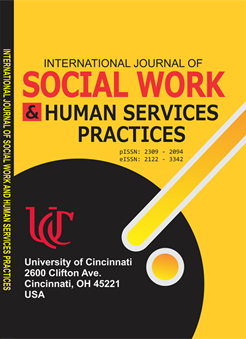INTERNATIONAL JOURNAL OF SOCIAL WORK AND HUMAN SERVICES PRACTICES (IJSWHSP)
EXPLORING CHILD ABUSE DYNAMICS, IMPACTS AND PREVENTIVE STRATEGIES IN SELECTED COMMUNITIES IN KOSOFE LOCAL GOVERNMENT AREA OF LAGOS STATE
E-ISSN: 2122-3342
P-ISSN: 2309-2094
DOI: https://iigdpublishers.com/article/752
Incidences of child abuse are ubiquitous in Nigeria. Everywhere one can glare at the different forms of abuses that Nigerian children are subjected to, both the ones that are conspicuous and the inconspicuous ones. This study thus examined the dynamics of child abuses, its impacts and preventive strategies. The study was based on six research objectives and four research questions which employed a survey research design. The study was carried out in Kosofe Local Government, Lagos State and the sample comprised 316 respondents. Questionnaire was used as the research instrument and data collected was analyzed using descriptive statistics and regression analysis at 5% level of significance. The results revealed that lack of awareness, inadequate implementation of child abuse laws, environmental background have led to an increase in cases of child abuse (mean: 2.52). Parents’ education level (mean: 2.92) and parents’ history of abuse (mean: 2.87) serve as a determining factor in child abuse incidence. Cultural practices are determinant factor in child abuse occurrence among children (mean: 2.67). Child abuse has negative effects on the victimized children (mean: 2.83). Parent education level has no significant effect on occurrence of child abuses (beta: 0.149, p= 0.054). Parent history with abuse has no significant effect on occurrence of child abuse (beta: -0.125, p= 0.122). Cultural practices have significant effect on the occurrence of child abuse (beta= 0.246, p= 0.000). Some preventive strategies include allocation of more resources to child protection agencies (mean: 3.15), promotion of awareness campaigns (mean: 2.78), policies and laws (mean: 2.62), and orientation programs for parents on parenting techniques (mean: 2.30). Based on the findings, the study recommended that governments and relevant authorities should prioritize the development and enforcement of comprehensive laws and policies specifically aimed at addressing cultural practices that contribute to child abuse. Large-scale awareness campaigns should be conducted to educate the general public about the detrimental effects of child abuse and the importance of creating a safe and nurturing environment for children.
Binuyo Biodun A., Adesanya Ocheze Happinesss, Obebe Pelumi, Ashaolu Adeola Kehinde & Aikisoyinu Timilehin
Alaka, M. (2015). Basic causes of child abuse and its impact: An overview. Indian Journal of Research, 4(5).
Alokan, F. B., & Olatunji, I. C. (2014). Influence of child abuse on classroom behaviour and academic performance among primary and secondary school students. European Scientific Journal, 10(10), 131–140.
American Humane Society. (n.d.). Child neglect. http://www.americanhumane.org/children/stop-child-abuse/factsheets/childneglect.html
Azi, A., & Saluhu, A. (2016). The effect of child abuse on the academic performance of school children: Implication on the Nigerian economy. Asia Pacific Journal of Education, Arts and Sciences, 3(3), 23–27.
Bada, S. O. (2015). Parents’ perception of the causes and effects of child abuse in Ondo State, Nigeria. International Journal of Academic Research in Psychology, 2(1), 53– 62.
